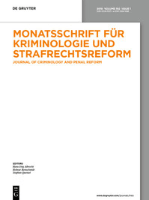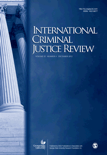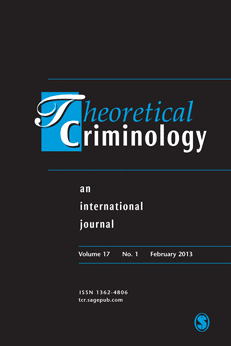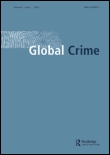
Russian Journal of Criminology
Scope & Guideline
Advancing criminological discourse in a unique Russian context.
Introduction
Aims and Scopes
- Criminal Law and Policy Analysis:
The journal emphasizes the examination of criminal law frameworks, their effectiveness, and the implications of legal policies on crime prevention and prosecution. - Criminological Research and Theory Development:
It promotes theoretical advancements in criminology, exploring diverse perspectives on crime causation, victimology, and offender profiling. - Emerging Technologies in Crime Prevention:
Research related to the role of new technologies, including AI and digital tools, in crime investigation and prevention is a key focus. - Transnational and Comparative Criminology:
The journal addresses comparative studies in criminology and criminal law, particularly in the context of post-Soviet states and international legal frameworks. - Social Issues and Crime:
It investigates the socio-economic and cultural factors influencing crime, including the impact of domestic violence, youth crime, and corruption.
Trending and Emerging
- Digital and Cybercrime:
There is a significant increase in research concerning digital crimes, cyberbullying, and the implications of technological advancements on criminal behavior and law enforcement. - Environmental Crime and Security:
Emerging themes related to environmental crimes and their regulation reflect growing concerns about ecological security and the legal frameworks needed to address these issues. - Gender-Based Violence and Domestic Issues:
The journal is increasingly focusing on domestic violence and gender-related crimes, highlighting the need for criminological assessments and legal reforms. - Criminal Justice Innovations:
Research on innovative practices within the criminal justice system, including restorative justice and rehabilitation methods, is gaining traction. - Global and Transnational Crime Issues:
There is a rising interest in transnational crime, particularly in relation to migration, trafficking, and organized crime, reflecting a need for comprehensive policy responses.
Declining or Waning
- Historical Criminology:
Research focusing on historical aspects of criminology, such as the evolution of criminal law in the 18th and 19th centuries, is less prevalent, suggesting a shift towards contemporary issues. - Traditional Victimology:
Studies centered on traditional victimology are declining, possibly due to a growing emphasis on modern forms of victimization, including digital and cyber victimization. - Local Crime Trends:
Analysis of localized crime trends in specific regions has seen reduced attention, as the journal increasingly prioritizes broader national and international issues. - Theoretical Criminology Frameworks:
There has been a noticeable decline in the exploration of classical criminological theories, as newer models and interdisciplinary approaches gain traction.
Similar Journals

PSYCHOLOGY CRIME & LAW
Innovating Research at the Crossroads of Crime and PsychologyPSYCHOLOGY CRIME & LAW, published by Routledge Journals, Taylor & Francis Ltd, is a premier academic journal dedicated to the intersection of psychology, criminology, and the law. With an ISSN of 1068-316X and an E-ISSN of 1477-2744, this journal provides a critical platform for the dissemination of cutting-edge research and innovative methodologies in the fields of psychology, forensic medicine, and legal studies. Spanning over three decades (1994 to 2024), it holds impressive Scopus rankings, placing it in Q1 and Q2 quartiles for its contributions to law and forensic medicine, highlighting its standing within the academic community. PSYCHOLOGY CRIME & LAW is particularly noted for addressing contemporary issues at the crossroads of human behavior and legal standards, making it essential reading for scholars, practitioners, and students alike. While the journal is not open access, it offers valuable insights into a variety of topics, from criminal psychology to the implications of mental health in legal contexts, ensuring that it remains an influential resource for those engaged in research and professional practice.

Monatsschrift fur Kriminologie und Strafrechtsreform
Transforming Perspectives on Law and Society.Monatsschrift für Kriminologie und Strafrechtsreform is a prestigious academic journal dedicated to advancing the fields of criminology and legal reform. Published by WALTER DE GRUYTER GMBH in Germany, this journal boasts a significant history since its inception in 1943, continually evolving its focus and scope from 2010 to 2024 to address contemporary issues in law and criminal justice. With an impressive Q2 rating in Law and a ranking in the 46th percentile among social sciences law journals, it serves as a vital resource for researchers, practitioners, and students alike. By publishing innovative articles, critical reviews, and comprehensive studies, the journal aims to foster academic discourse and propel discussions surrounding legislative reforms and criminological theories. Although it does not currently offer open access, readers can obtain valuable insights that contribute to both academic scholarship and practical applications in the legal field, thereby enhancing the understanding of complex societal dynamics related to crime and law enforcement.

JOURNAL OF CRIME & JUSTICE
Bridging Gaps in Legal ScholarshipJOURNAL OF CRIME & JUSTICE, published by TAYLOR & FRANCIS INC, is a leading scholarly journal in the field of law, with an impressive Q1 ranking in the category of Social Sciences (law) and a robust impact factor reflecting its significant influence in the academic community. With a history spanning from 1984 to 2024, this journal serves as a crucial platform for researchers, practitioners, and students to explore and disseminate new insights related to crime and justice issues, including policy analysis, legal frameworks, and sociological perspectives. Based in the United Kingdom, the journal aims to foster interdisciplinary dialogue and is a vital resource for those engaged in the ever-evolving fields of criminology and law. Although it does not offer open access, the journal is accessible through institutional subscriptions, ensuring that essential research remains within reach for scholars committed to advancing their understanding of complex justice systems.

International Criminal Justice Review
Fostering innovative solutions for international crime.International Criminal Justice Review is a premier journal in the field of law, published by SAGE Publications Inc, renowned for its commitment to advancing the understanding of criminal justice issues on a global scale. With an ISSN of 1057-5677, this journal spans a rich history from its inception in 1991 to its ongoing contributions into 2024, supporting a diverse array of research that addresses both theoretical and practical concerns in international criminal law. The journal holds a prestigious Q1 ranking in the Law category for 2023, reflecting its influence and relevance, as evidenced by its impressive Scopus rank of #68 out of 1025 in the Social Sciences Law field, placing it in the 93rd percentile. Though not an open-access journal, it provides vital access options for institutions and individuals alike. International Criminal Justice Review serves as a critical resource for researchers, practitioners, and students dedicated to exploring the complexities of international criminal justice systems, offering a platform for innovative scholarship that informs policy and practice worldwide.

CRIME LAW AND SOCIAL CHANGE
Cultivating Knowledge for a Safer, Just SocietyCRIME LAW AND SOCIAL CHANGE, published by SPRINGER, is a distinguished journal that caters to an interdisciplinary audience including researchers, professionals, and students in the fields of law, social sciences, and forensic medicine. With an ISSN of 0925-4994 and an E-ISSN of 1573-0751, this journal is a vital resource for those looking to explore the dynamic interplay between legal frameworks and societal change, particularly in relation to crime and its implications. As of 2023, it holds a commendable Q2 category ranking in Law and Social Sciences and a Q3 ranking in Pathology and Forensic Medicine, showcasing its impact within these vital domains. With its converged publication years from 1991 to 2024, CRIME LAW AND SOCIAL CHANGE is pivotal in advancing scholarly discourse and offering access to high-quality research that informs both policy and practice. Although not an open access journal, it provides valuable insights to its audience through rigorous peer-reviewed articles, making it an indispensable part of the academic literature in its respective fields.

JOURNAL OF CRIMINAL LAW & CRIMINOLOGY
Innovating Perspectives in Criminal Law and CriminologyJournal of Criminal Law & Criminology, published by Northwestern University, is a premier scholarly journal dedicated to advancing the understanding of criminal law and criminological theories. Established in 1974, it has a strong history of publishing rigorous empirical research and critical analyses, contributing significantly to the discourse in legal and criminal justice studies. With an impressive impact factor and recognized as a Q1 journal in Law, it ranks favorably within the Scopus database, positioned in the top 25% of its category. This journal is essential for academics, legal practitioners, and students seeking insightful perspectives and developments in contemporary criminal justice issues. Although not open access, it provides a wealth of resources and discussions, making it an invaluable asset for anyone engaged in the study of law and criminology.

International E-Journal of Criminal Sciences
Unveiling Insights into Crime and Justice SystemsWelcome to the International E-Journal of Criminal Sciences, a distinguished platform dedicated to the rigorous exploration of contemporary issues within the field of criminal sciences. Published by the DMS INT RESEARCH CENTRE, this journal aims to disseminate high-quality research and critical analyses that foster a deeper understanding of criminal behavior, law enforcement strategies, justice systems, and related societal impacts. With its commitment to open access, it ensures that knowledge is readily available to a global audience, promoting inclusivity and academic collaboration across borders. Although specific metrics like impact factor and H-index have yet to be established, its relevance and contribution to the discourse on criminal sciences remain significant. Researchers, professionals, and students are invited to engage with the journal’s valuable insights, as it strives to become a leading resource for innovative thought and evidence-based solutions in the evolving landscape of criminal science.

THEORETICAL CRIMINOLOGY
Innovating Theoretical Frameworks for Modern IssuesTHEORETICAL CRIMINOLOGY is a premier academic journal published by SAGE PUBLICATIONS LTD that serves as a vital platform for the dissemination of cutting-edge research in the realms of law, sociology, and forensic medicine. Established in 1997 and converging into a comprehensive resource through 2024, this journal has achieved a remarkable reputation with a 2023 Q1 ranking in Law as well as in Sociology and Political Science, underscoring its influential contributions to these disciplines. Situated in the United Kingdom, it is recognized for its rigorous peer-reviewed content and holds prestigious positions in Scopus rankings, including Rank #34 in Social Sciences - Law and Rank #38 in Medicine - Pathology and Forensic Medicine, reflecting its commitment to academic excellence. Although it does not currently offer open access options, the journal ensures that its articles are accessible through institutional subscriptions, making it an indispensable resource for researchers, professionals, and students aiming to deepen their understanding of theoretical frameworks and contemporary issues in criminology.

Trends and Issues in Crime and Criminal Justice
Innovating solutions for a safer society.Trends and Issues in Crime and Criminal Justice is a leading journal in the field of criminology, published by the Australian Institute of Criminology. This esteemed journal, recognized with an H-index that reflects its influence and contribution to the social sciences, particularly law, spans from 2011 to 2024 and is ranked in the Q1 category within its discipline according to the 2023 data. With a Scopus ranking of #123 out of 1025 in the Social Sciences - Law category, placing it in the 88th percentile, it serves as a critical resource for researchers, practitioners, and students alike.
Focused on innovative research and emerging issues within crime and criminal justice, the journal seeks to foster scholarly collaboration and discourse, making it an essential hub for new ideas and evidence-based practices in the field. The journal’s commitment to advancing knowledge and influencing policy ensures that it remains an influential voice in criminological studies, aiming to address pressing issues facing societies globally.

Global Crime
Exploring the Complexities of Crime Across BordersGlobal Crime is a leading scholarly journal published by Routledge Journals, Taylor & Francis Ltd, focusing on the multifaceted dimensions of crime and justice on a global scale. With an ISSN of 1744-0572 and E-ISSN of 1744-0580, this journal serves as a critical platform for researchers, practitioners, and policymakers interested in the intersection of legal studies, political science, and sociological perspectives. The journal boasts a prestigious Q1 ranking in Law and notable Q2 rankings in Political Science and International Relations, as well as Sociology, highlighting its influential role in shaping academic discourse. In 2023, it ranked #88 out of 1025 journals in Law, placing it in the 91st percentile, thus ensuring its status as an essential resource for those engaged in advanced research. While it does not currently offer open access options, Global Crime continuously seeks to illuminate the complexities of crime, fostering a better understanding through comprehensive studies, critical analyses, and innovative approaches. By converging insights from various disciplines, the journal aims to facilitate dialogue among academics and practitioners alike, ultimately advancing the field of criminal justice globally.